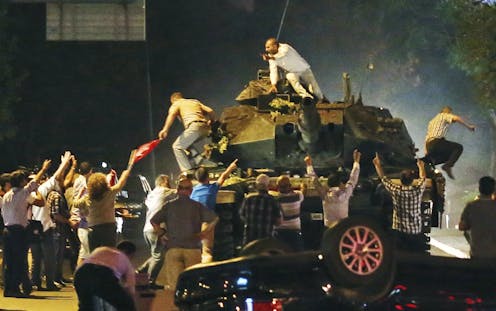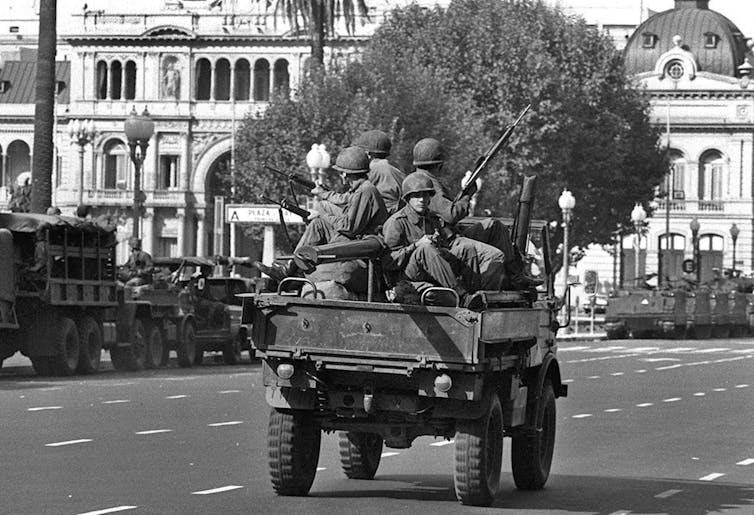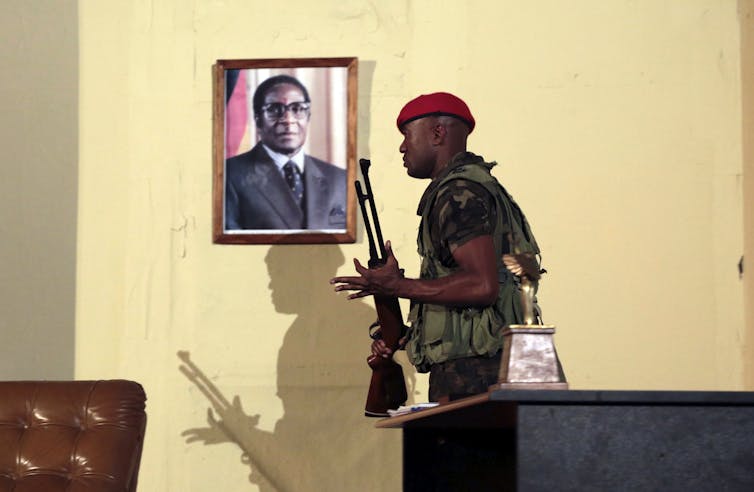No coups occurred in 2018. Will next year be so stable?
2018 is on track to become only the second coup-free year in a century. Coup risk is way down worldwide, thanks to growing political stability in Latin America. Africa has the highest risk of coup.

The past year may have felt politically tumultuous, between Saudi Arabia’s brazen killing of journalist Jamal Khashoggi in Turkey, the resurgence of authoritarianism in Eastern Europe and Donald Trump’s unorthodox approach to U.S. foreign policy.
But in some ways 2018 was unusually stable. It is on track to be only the second year in a century without a coup d’état. The last head of state overthrown was Zimbabwe’s Robert Mugabe in November 2017.
There have been 463 coup attempts worldwide since 1950, 233 of which were successful. These undemocratic power transfers have sparked civil wars, triggered authoritarian crackdowns and stunted economic growth.
Before 2018 the only other coup-free year in the past century was 2007.
Declining risk of coups worldwide
Coups and coup attempts have existed as long as governments have.
Caesar crossed the Rubicon in 49 B.C. in a coup against the Roman Senate, only to face a counter-coup on the Ides of March. Napoleon Bonaparte took power through a military coup. Hugo Chavez led a failed coup years before winning election.
During the late 20th century, there was a 99 percent chance that at least one coup would happen each year, according to CoupCast, which uses data on elections, economics, conflict, leadership and politics to predict which countries are most likely to see a coup attempt. Coup risk began to decline in 2000, reaching an all-time low of 88 percent in 2018.
This welcome progress on political stability was not evenly distributed across the globe, our analysis of CoupCast data finds. Some regions saw their coup risk decline much more significantly.
Latin America was a 20th-century epicenter of coup activity. Countries like Argentina, Venezuela, Honduras and Bolivia all saw numerous democratically elected leaders overthrown by the military.
Occasionally, Latin American leaders who came to power in a military coup were themselves deposed in a military coup. That’s what happened to Argentine President Gen. Juan Perón in 1955. Perón’s second wife, Isabel, was also overthrown by the military.

But of the 142 recorded coup attempts in Latin America since 1950, only five occurred since 2000. Honduran president Manuel Zelaya’s 2009 ouster by the army was the most recent.
Coups used to be common in Asia, too. In Thailand and Pakistan, in particular, forced leadership change was a hallmark of their turbulent democracies after World War II.
That is changing. Only six of Asia’s 62 recorded coup attempts occurred in the last 18 years.
How Latin America and Asia stabilized
Research on Argentina, Bolivia and other Latin American countries with a history of coup d'etats indicates that in highly authoritarian countries, these events can eventually have a democratizing effect.
It’s counterintuitive, but successful coup leaders often undertake a transition to democracy to boost their legitimacy and help economic growth. Failed coups can also drive authoritarian leaders toward reform, studies show.
Asia’s move away from coups this century was similar to Latin America’s in some ways.
South Korea’s 1961 coup, for example, was followed by rapid economic growth and, decades later, a return to democracy.
But greater interdependence between Asian nations and global superpowers in the post-Cold War period also contributed to broader regional stability. That, in turn, created economic growth that drives democratization and stabilizes nations.
A cycle of instability in some African countries
Political stability in Africa has improved since 2000, but it has not kept pace with Latin America and Asia. The region has had 35 coup attempts in the past 18 years – an average of two per year.
Africans are 10 percent more likely to live through a coup than people in other parts of the globe, CoupCast data shows.
In our analysis, two factors drive Africa’s continued coup risk: the economy and a regional history of coups.
While many African countries have seen substantial economic progress in recent decades – particularly Nigeria, Ghana and Ethiopia – growth remains uneven and overall poverty in the region has declined only marginally since 2000.
Poor economic conditions can trigger popular unrest. Poverty and protests, like those seen recently in Uganda and Malawi, often combine to serve as a signal of support to would-be coup-plotters.

Coups can also create a vicious cycle of political instability. Of the 12 African nations that have seen coup attempts since 2007, half – including Guinea Bissau and Burkina Faso – have had multiple coups.
A long national history of military ousters makes nondemocratic transfers of power seem normal, leading to more coups. And while coups can sometimes help economic growth, in Africa the instability they’ve caused has mostly hurt economies.
Coup risk in 2019
Latin American countries escaped the coup treadmill after 30 years, despite dire economic and political conditions. Asia emerged from its vicious coup cycle in less time than that.
Africa probably will, too.
It is on the right path. CoupCast projects just a 55.5 percent chance of at least one coup attempt taking place in Africa in 2019, down from a forecast this year of a 69 percent chance of a coup attempt.
And, of course, coup predictions are just that: political analysts’ best guesses. There were no coups in Africa, or anywhere else, in 2018.
Next year, CoupCast shows an 81 percent chance of at least one coup attempt somewhere in the world.
Clayton Besaw is a research associate with the One Earth Future Foundation, a non-profit organization that promotes peace and security in post-conflict countries.
Matthew Frank is a researcher at the One Earth Future Foundation.
Read These Next
Graduation rates for low-income students lag while their student loan debt soars
Nearly half of all students who enroll in college never finish. Are colleges and universities to blame?
The tragedy of sudden unexpected infant deaths – and how bedsharing, maternal smoking and stomach sl
Rates of sudden unexpected infant deaths have not gone down significantly over the last 20 years, and…
Billions of cicadas are about to emerge from underground in a rare double-brood convergence
The last time that these two groups of cicadas emerged from underground together, Thomas Jefferson was…




